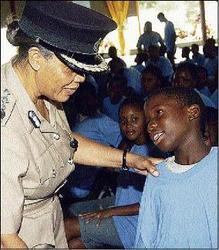Mark Titus, Enterprise Reporter

Jevene Bent (left), deputy commissioner of police, gives 10-year-old Roy Ewan some solid advice before the start of the Kingston Western Police Division summer camp opening ceremony in 2007. Establishing trust among residents is viewed as a critical component to averting crime. - Norman Grindley/Deputy Chief Photographer
Assistant Commissioner of Police John McLean, head of the constabulary's Community Safety and Security Branch, believes the force's latest community policing thrust should have a positive impact on crime within one year of its implementation.
Community policing - a stark contrast to combative approaches to crime fighting - aims to establish trust by forging partnerships between law enforcement agents and residents.
"As with any change, there is some pain along the way, before we can start harvesting the benefits of this style of policing, but I would be very surprised if we don't see some rapid changes in the course of the next year," said McLean.
"What we are looking to do is to change the approach to policing in Jamaica, from one that focuses on reaction and detection, to one that is proactive and preventative," he added.
Failed strategy
Although community policing is nothing new to Jamaica, McLean argues that that strategy has largely failed.
"The killing still goes on, some of them get more and more ruthless, and people will say there are police out there to do the tough policing job, but that (tough policing) will always be a part of policing in Jamaica," said McLean, one of five British nationals on secondment to the Jamaica Constabulary Force.
The lawman noted, however, that community policing was not a strategy of appeasement which would give hardened criminals free rein. McLean, in his short stint, knows this too well. Already, five cops have been murdered in 2008.
"There is no such thing as soft policing. A community policeman will help you to solve your problem, but if you give him cause to put you in jail, he will put you in jail," McLean stated.
The Briton concurs with Police Commissioner Hardley Lewin that law enforcement alone will not address Jamaica's murder wave, which has so far claimed more than 700 people this year. Political and civic will, says McLean, in addressing social problems, is a critical complement to the police initiative.
Gaining respect

McLean
"Community policing on its own is not the answer. It is no panacea for Jamaica's woes," he said. "Good social interventions are also needed, where people start to get their lights on the streets fixed, their open sewers fixed, their garbage collected. When people start to get a certain level of service, then they will have that more respect."
McLean cited an instance in the St James trouble spot, Flankers, where lawmen intervened after an upsurge of violence and dialogue and a show of respect earned the police praise.
"Community policing is not a five-minute job," McLean said emphatically.
While reserving comment on costing for the rollout of the community-policing initiative, which will require massive training and retraining of staff, McLean said partnerships with international organisations have resulted in the acquisition of much-needed equipment. Relations have also been strengthened with the Social Development Commission, which will be working closely with the police in the communities.
Biggest challenge
"The biggest challenge in resources is human resources, the biggest challenge for the commissioner of police and the divisional commanders is to find sufficient personnel to make this initiative a success.
"One of the challenges of community policing is to have the officers trained, but not utilised properly. A community police must be dedicated to a neighbourhood, for about two or three years," he said.
Community policing was among the police commissioner's four-pronged plan to tackle crime, particularly homicides.
The other areas are the dismantling of criminal networks, increased policing and curfews.
mark.titus@gleanerjm.com

